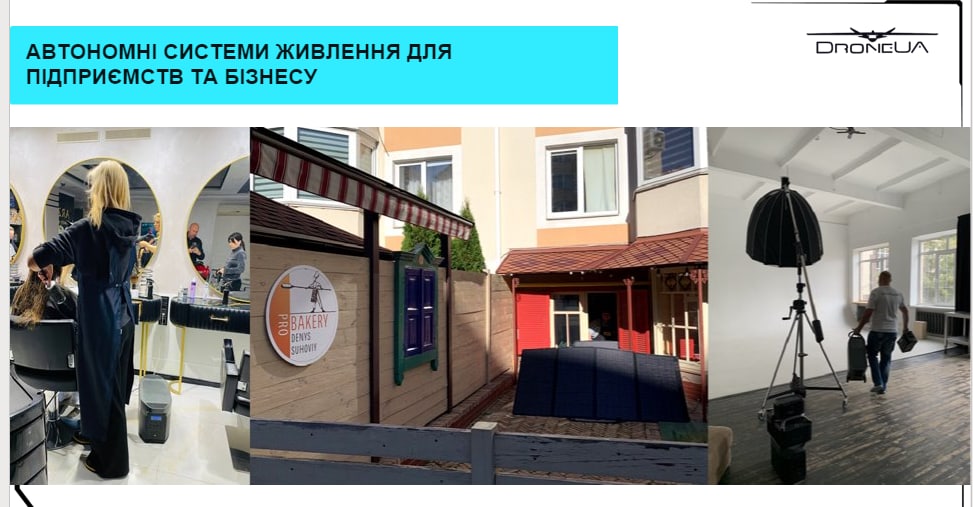On December 22, in cooperation with the Reform team under the Ministry of Economy of Ukraine (MEU), Economic Resilience Activity (ERA) held the eighth online dialogue platform “Support for Business in Wartime: Relocation and Recovery”.
About 60 representatives of businesses, Oschadbank, Lviv City Council, and energy efficiency consultants took part. They talked about alternative energy supply for businesses and support programs for small and medium-sized enterprises during war and emergency power outages.
Participants learned about energy equipment import companies.
“Since October, we have supplied the Ukrainian market with more than 19,000 charging stations for lighting homes and supporting small businesses: salons, coffee shops, doctors, garages. We live in conditions when energy is an opportunity to work and be in touch. Now people need small charging stations. We provide an example of how our equipment can be used at home. These stations will make a significant contribution to energy accumulation. The market has increased tenfold; we continue to supply a huge number of generators and predict the growth of energy security for families, as part of forming an energy-independent country. At the same time, we need to invest time and money in educating people how to use electrical appliances,” said Valerii Yakovenko, DroneUA co-founder and representative of EcoFlow.
A delivery company representative described the options for ordering generators and Starlinks in the USA and EU countries.
“We faced enormous challenges with importing power equipment. Later the government lifted the duty on importing such goods. There is a major shortage in the Ukrainian market, so we need imports. We have a program, Shopping, where people can buy goods in the USA and EU at manufacturer’s prices, and we will deliver these goods to Ukraine. Since autumn 2022, stores selling uninterruptible power stations, generators, and Starlinks are the most popular. We use airlines and trucks to deliver this equipment to Ukraine. Orders are increasing, people need communication and electricity. Now in Poland we are accepting rechargeable batteries for shipment, but they must be new,” said Olena Tverdovska, Customer Support Director at Nova Poshta Global.
Businesses can purchase a generator and other equipment for alternative energy supply with a loan from Oschadbank. Such a loan is calculated for a period of 6 to 60 months, and entrepreneurs should contribute at least 30%.
“You can buy equipment abroad and get a deferred payment of up to several months for the period of its delivery. Such loans are taken out by legal entities and entrepreneurs who trade, produce, and provide services. A positive credit history is required. Entrepreneurs from government-controlled and newly liberated territories (except Kherson) can apply for loans. Currently, more than 20 applications worth UAH 18 million have been processed. The average time from submitting a loan application to money disbursement is 7–10 days,” said Andrii Popyk, Head of the Department of Micro, Small and Medium-sized Business at JSC Oschadbank.
Regional programs to assist businesses with electricity supply are currently being implemented in Ukraine. Lviv City Council has introduced relocation vouchers up to UAH 100,000. Entrepreneurs who have re-registered their business in Lviv Oblast can receive this money to reimburse rent for premises. There are also compensation vouchers for partial reimbursement of property damaged by shelling. Lviv City Council offers energy supply vouchers covering up to 50% of the cost of generators, batteries and power banks for small businesses such as coffee shops, bakeries, health centers, hairdressers and other socially important institutions. The business should also perform a social function and become a so-called invincibility point, allowing people to recharge their phones, warm up, and drink hot tea. To reduce the burden, businesses have been exempted from paying advertising tax. Another support program operates in Zakarpattia Oblast. Oschadbank signed a memorandum with Zakarpattia Oblast Administration, which pays 30% of loans for the client.
Anton Shapkovskyi, Energy Efficiency and Alternative Energy Consultant of USAID Municipal Energy Reform Project in Ukraine, spoke about compliance with requirements for installing generators in industrial premises and on the street.
“Now people are starting to return equipment for repair due to non-compliance with operating requirements. Generators are placed near pharmacies or shops on the street, under the windows of neighboring houses. This can cause carbon monoxide poisoning, as well as the risk of electric shocks due to damaged cables; often such installations are not earthed, and pedestrians can be injured. It is necessary to ensure that fumes are properly ventilated away from people and apartments,” said Shapkovskyi.
Participants also learned why homemade equipment should not be used instead of bought equipment. For safety reasons, it is advisable to use certified equipment for charging speed, especially for powering expensive devices. It is possible to import energy equipment from the USA and EU, and resumption of supplies from China is planned in February. Participants also discussed inevitable changes in energy supply that are necessary to restore a sustainable new economy of Ukraine.




